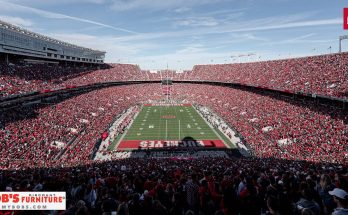LVI victory in 2022, Stafford’s legacy has been thrust into the spotlight, sparking heated discussions among analysts, fans, and former players. Some argue that his career achievements, including his prolific passing numbers and clutch performances, make him a lock for Canton. Others contend that his résumé is inflated by volume stats and that he lacks the consistent elite play required for Hall of Fame enshrinement. So, where does the truth lie? Is Stafford truly a future legend, or is his reputation overhyped?
Supporters of Stafford’s Hall of Fame case point to his impressive statistical résumé. As of the 2023 season, Stafford ranks in the top 15 all-time in passing yards and touchdowns, surpassing many quarterbacks already enshrined in Canton. His arm talent has never been in question—Stafford’s ability to make every throw on the field, from laser-guided deep balls to perfectly placed back-shoulder fades, has drawn comparisons to some of the game’s all-time greats.
Beyond the numbers, Stafford’s toughness and durability stand out. He played through numerous injuries during his time with the Detroit Lions, including a broken collarbone and multiple finger and rib issues, earning respect from teammates and opponents alike. His willingness to stand in the pocket and deliver strikes under pressure became a hallmark of his game, even when playing behind subpar offensive lines in Detroit.
Then there’s the Super Bowl factor. Winning a championship is often the tipping point for Hall of Fame debates, and Stafford’s performance in the 2021 playoffs was nothing short of stellar. He outdueled Tom Brady in the divisional round, made critical throws to help defeat the San Francisco 49ers in the NFC Championship, and then delivered a game-winning drive in the Super Bowl against the Cincinnati Bengals. That postseason run showcased his ability to elevate his play when it mattered most, silencing critics who had labeled him a stat-padder who couldn’t win big games.
Stafford’s late-career resurgence with the Rams also bolsters his case. After being traded from Detroit—where he spent 12 seasons with little team success—he immediately transformed the Rams into a title contender. His chemistry with Cooper Kupp was electric, and his leadership helped guide a star-studded roster to the pinnacle of the sport. This narrative—a talented but overlooked quarterback finally getting his due on the big stage—resonates with fans and could sway Hall of Fame voters when the time comes.
Detractors, however, argue that Stafford’s Hall of Fame candidacy is built more on longevity and volume than sustained excellence. While his career numbers are undeniably impressive, they were accumulated in an era where passing stats have exploded league-wide. Stafford benefited from playing in pass-heavy offenses for most of his career, and his efficiency metrics—such as career passer rating and completion percentage—are solid but not elite. Compared to contemporaries like Aaron Rodgers, Patrick Mahomes, and Drew Brees, Stafford’s efficiency falls short of the gold standard.
Another sticking point is his lack of individual accolades. Stafford has only one Pro Bowl selection (2022) and has never been named First-Team All-Pro. Hall of Fame quarterbacks typically boast multiple Pro Bowls, All-Pro nods, or MVP awards, and Stafford’s thin trophy case in these categories weakens his argument. While winning a Super Bowl helps, it’s worth noting that he was never considered the best quarterback in the league at any point in his career—something that can’t be said for most Hall of Fame signal-callers.
Critics also highlight Stafford’s inconsistency in Detroit. Despite his gaudy numbers, the Lions only made the playoffs three times during his tenure, winning zero postseason games. While Detroit’s organizational dysfunction wasn’t entirely his fault, the lack of team success raises questions about his ability to elevate mediocre rosters—a trait often associated with all-time greats. Even in his Super Bowl season with the Rams, Stafford led the NFL in interceptions, a reminder of his occasional bouts with erratic decision-making.
Finally, there’s the “system quarterback” argument. Some believe Stafford’s success in Los Angeles was more a product of Sean McVay’s offensive genius and the team’s stacked roster than his own brilliance. Cooper Kupp’s historic 2021 season, the dominant offensive line, and a defense loaded with playmakers all played pivotal roles in the Rams’ championship run. Would Stafford have won a Super Bowl without such a talented supporting cast? It’s a fair question that Hall of Fame voters may ponder.
So, is Matthew Stafford a future Hall of Famer? The answer likely depends on how much weight one assigns to different aspects of a player’s career. If raw passing numbers, toughness, and a Super Bowl ring are the primary criteria, Stafford has a compelling case. But if individual accolades, efficiency, and sustained dominance are prioritized, his résumé looks shakier.
Historically, the Hall of Fame has been kind to quarterbacks with a championship and strong career totals—players like Jim Plunkett and Phil Simms, however, didn’t make it, while others like Eli Manning (with similar stats and two rings) are still debated. Stafford’s path may hinge on how his peers from this era are viewed. If Eli Manning eventually gets in, Stafford’s chances improve. If not, he may find himself on the outside looking in.
One thing is certain: the debate isn’t going away anytime soon. As Stafford continues his career—whether adding to his legacy or fading into retirement—the arguments will rage on. For now, he remains one of the most polarizing figures in the Hall of Fame conversation, a quarterback whose legacy is as much about what he didn’t accomplish as what he did. Whether that’s enough for Canton remains to be seen.


